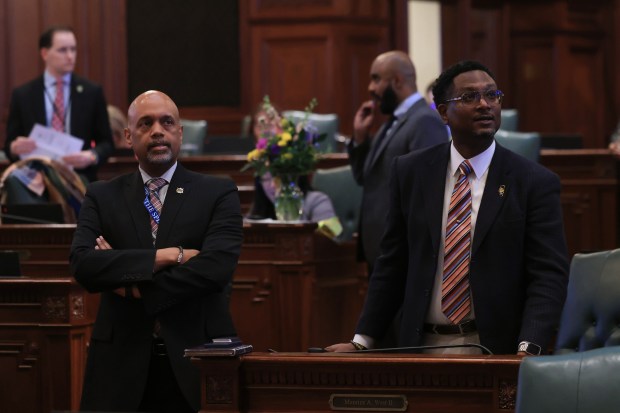What happens when a Muslim man moves into a predominantly white, politically divided suburb a month after the 2024 election? In Rehana Lew Mirza’s new play, “Neighborhood Watch,” it means that the white-haired NPR listener who still wears Bernie 2016 and Clinton-Gore ’92 T-shirts starts acting pretty weird.
This world premiere, directed by Kaiser Ahmed for Jackalope Theatre, is the latest play to skewer the hypocrisies of white liberals — a genre most recently seen on Chicago stages in Larissa FastHorse’s satire of progressive theater-makers, “The Thanksgiving Play,” and Omer Abbas Salem’s tense academic drama, “One Party Consent.” Mirza’s new work can best be categorized as a dramedy, though the comedic elements come off more successfully than the domestic drama at its core.
In the first scene, we meet Paul (Frank Nall), a widower and single father to Becca (Jamie Herb), a recent college graduate who’s moved back into her dad’s Virginia home while she searches for a job. When Mo (Harsh Gagoomal), a handsome man around Becca’s age, moves into the house next door, sparks fly between the two young people while Paul’s liberal values are put to the test.
Mirza’s script serves up plenty of situational humor in the first act, which is full of cross-cultural misunderstandings and awkward gaffes. When Paul brings a house-warming gift to the new neighbor, the older man seemingly can’t open his mouth without making a cringeworthy remark, despite his intention to be welcoming. At one point, he says he’s glad that Mo has moved in, since the neighborhood was getting a little too white. Meanwhile, Mo amuses himself by winding up his new neighbor, intentionally playing into white stereotypes about Muslim men.
It’s pretty light-hearted fun until Mo and Becca start dating, at which point Paul’s protective instincts kick in as he listens to the Iago-like whisperings of his middle-aged MAGA neighbor, who has a creepy crush on Becca and a shady business as a private investigator. Shawn, a campy character played by Victor Holstein, soon convinces Paul to hire him to spy on the young couple.
Halfway through the play, Mo’s past catches up with him with the appearance of a fifth character, Javed (Omar Bader), a cousin who grew up with Mo before serving a prison sentence for electronic terrorism — a juvenile offense of posting extremist videos and making threats online. As Becca gets to know both of the cousins better, Paul’s paranoia grows, and his surveillance tactics quickly escalate.
While the comedy works well in Act 1, the relationships between most of the characters aren’t developed enough for the drama that unfolds in the second act to make much of an impact. Herb and Gagoomal have strong chemistry as Becca and Mo, but the play’s father-daughter relationship is less convincing. Paul’s motivations come across as overly simplistic, and it seems far-fetched that he would so easily put his trust in Shawn at the expense of his daughter’s privacy. The belated introduction of Javed makes his storyline feel rushed, while the overall pacing lags in the second act, which is a letdown after the explosive setup just before intermission.
Mirza seems interested in complicating stereotypes about suburban polarization but only offers a surface-level exploration of these themes. First, there’s the unlikely alliance between Paul and Shawn, which pokes at the so-called horseshoe theory — the idea that far-left and far-right ideologues are more alike than different, circling around to meet at a similar point. On the other hand, Paul also discovers that he has more in common with Mo than it first seemed, a realization that doesn’t reflect well on either of them by the end of the play.
Although these ideas and characters would benefit from further development, “Neighborhood Watch” is already a lot of fun in its current form. This is likely the first fully staged production that you’ll see featuring Harris-Walz yard signs (set design by Tianxuan Chen), and Mirza also works in a reference to Luigi Mangione. All that to say: the play is topical, and perhaps rushed to the stage too quickly, but it’s a good time — even for well-meaning white liberals who may find themselves the punchline of a few jokes.
Emily McClanathan is a freelance critic.
Review: “Neighborhood Watch” (2.5 stars)
When: Through June 28
Where: Broadway Armory Park, 5917 N. Broadway St.
Running time: 2 hours, 5 minutes
Tickets: $15-$40 at jackalopetheatre.org



